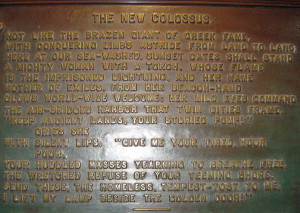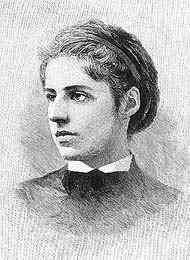
Will the torch burn out?
The Statue of Liberty, which displays at its base the famous poem, “Give me your tired, your poor, your huddled masses yearning to breathe free, the wretched refuse of your teeming shore. Send these, the homeless, tempest-tossed to me. I lift my lamp beside the golden door!” will soon have to seek exile, because she’s a foreigner and cannot prove that she is Christian.
Since the Paris attacks, the U.S. politicians have devoted themselves to feed the best of the worst: more fear, more war, more surveillance, more xenophobia and, of course, a new external enemy.
To the immigrants, this hampers any improvement in their lives. For the Muslim communities in the U.S. and abroad, this is a nightmare resembling the days after the Sept. 11 attacks.
 The fear sown by the politicians has had almost instantaneous effects. A new Washington Post/ABC News poll shows that 83 percent of the registered voters believe that a major terrorist attempt is probable in the near future (that’s at least 10 points more than a separate poll earlier in November) and a majority of voters opposes allowing refugees from Syria and other Middle East countries into the U.S.
The fear sown by the politicians has had almost instantaneous effects. A new Washington Post/ABC News poll shows that 83 percent of the registered voters believe that a major terrorist attempt is probable in the near future (that’s at least 10 points more than a separate poll earlier in November) and a majority of voters opposes allowing refugees from Syria and other Middle East countries into the U.S.
Politicians from both parties, especially from the right, have triggered a xenophobic — rather, Islamophobic — wave. Last week, the U.S. House of Representatives passed by 289 votes to 137 (almost all the Republicans, plus 50 Democrats) a bill to restrict the entry into the U.S. of refugees from Syria and Iraq.
Most of the nation’s governors — at least 31 — have promoted measures to prohibit the access of those refugees to their states.
All this is accompanied by the Republican presidential hopefuls, who favor a religious war. Donald Trump suggested a program to register every Muslim in the country, something that Muslim leaders and politicians from both parties repudiated. Some of them compared that idea to the registration of Jews by the Nazis.
Shortly before, after a couple of Syrian families surrendered to the immigration authorities on the border with Mexico, Trump tweeted that that action demonstrated even more the need for “a great and beautiful wall” along the border.
Jeb Bush and Ted Cruz, among others, propose giving a religious test to refugees and allowing only Christians. Ben Carson even compared Syrian refugees to “a rabid dog running around in your neighborhood.”
Muslim leaders, some politicians, intellectuals, artists, editorial writers, and even President Obama condemn this rhetoric of hatred which, they say, violates the most basic U.S. values.
“This is more than horrific,” commented Nihad Awad, director of the largest U.S. group of Muslim advocacy, the Council on American-Islamic Relations (CAIR). Civil rights groups warn that multiple incidents of threats and acts of hatred toward Muslims in various parts of the country have already been recorded.
When Jeb Bush was asked by a reporter how he would determine who among the refugees are Christians, the candidate hesitated and commented: “You can prove you’re a Christian … I think you can prove it.”
Perhaps the most elegant and devastating comment came from Stephen Colbert, host of the national TV program The Tonight Show, who suggested that “If you want to know if somebody is Christian, just ask them to complete this sentence.
“Jesus said, ‘I was hungry and you gave me something to eat. I was thirsty and you gave me something to drink. I was a stranger and you…’ Colbert paused. “If they don’t say, ‘welcomed me in,’ they are either terrorists or they’re running for president.”
It is not the first time that xenophobia and anti-immigrant madness have spread (madness, because the U.S. was founded and populated by immigrants.) We should remember that in the 1930s, at the start of the Great Depression, the U.S. corralled, expelled and deported (in cattle cars, in some cases) almost 2 million Mexican immigrants, perhaps half of whom were naturalized citizens of the United States.
In previous years, shortly after World War One, the government launched hunts and deportations of “Reds,” and accused immigrants — particularly anarchists — of importing anti-American ideas that endangered the government.
During the early years of World War Two, the U.S. refused to allow a ship full of Jewish refugees fleeing from the Nazis to enter one of its ports and forced it to return to Europe. Among its justifications, it claimed that among the Jews there might be “communists.” Many of those refugees ended up dying in concentration camps.

In another episode, shortly after the bombing of Pearl Harbor by the Japanese, President Franklin D. Roosevelt ordered the internment of about 120,000 Japanese Americans (children included) in concentration camps in the western United States.
Some commentators point out that there is a certain irony in that Thanksgiving Day (Nov. 26) commemorates how the English refugees arriving in present-day Massachusetts survived, thanks to the native Americans. The social networks are disseminating a cartoon that shows an American Indian telling one of the newly arrived Puritans: “Sorry, but we don’t allow refugees.”
The poem at the Statue of Liberty, engraved on a plaque on its pedestal, was written by Emma Lazarus in the late 19th Century. It states that she is “A mighty woman with a torch […] and her name Mother of Exiles” welcoming the world’s rejects.
We should remember that the statue was built in Paris and was a present from France to the United States. What recently happened in Paris is now used to betray its message.
Perhaps “the Mother of Exiles” will have to flee from this country and join the 60 million displaced persons and refugees in this world, if her increasingly dim torch is finally extinguished.
(From the Mexican newspaper La Jornada.)

